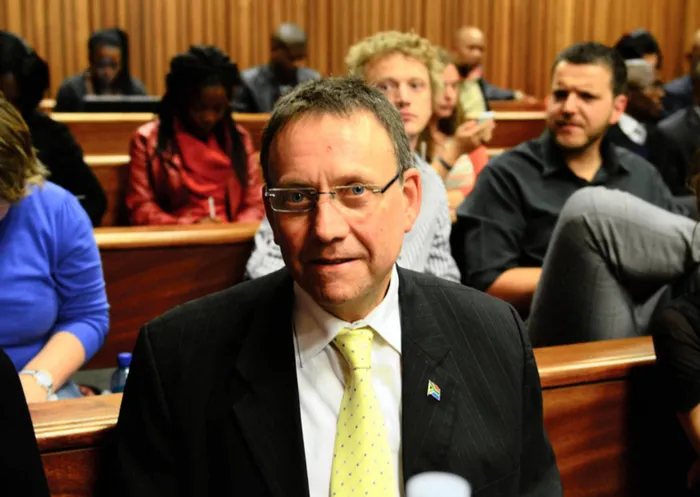Zuma ‘opportunistic’, says judge

24.7.2013 James Self of the DA in the so-called Zuma spy tapes hearing in the Pretoria High Court. Picture: Etienne Creux 24.7.2013 James Self of the DA in the so-called Zuma spy tapes hearing in the Pretoria High Court. Picture: Etienne Creux
Pretoria - The so-called Zuma spy tapes were already in the public domain and it was “opportunistic” for President Jacob Zuma to now contend there was a breach of confidentiality when he benefited from the alleged disclosure, a High Court judge said on Friday.
Judge Rami Mathopo ordered Acting National Director of Public Prosecutions Nomgcobo Jiba to hand over recordings and transcripts of conversations referred to by former Acting NPA head Mokatedi Mpshe when he formally withdrew fraud and corruption charges against Zuma in 2009.
The recordings, obtained by the National Intelligence Agency (NIA), formed the basis for the decision not to prosecute Zuma.
The ruling in the High Court in Pretoria follows an application by the Democratic Alliance (DA), who wants to take Mpshe's decision on review.
Jiba was also ordered to hand over internal memoranda, reports or minutes of meetings dealing with the contents of the recordings - insofar as these documents did not serve to breach the confidentiality of Zuma's written or oral representations to the NPA.
Jiba was ordered to clearly mark which portions of the documents she regarded as confidential and the DA would have the right to approach a Judge for a ruling if there was any dispute.
The Supreme Court of Appeal (SCA) in March last year also ordered the NPA to hand over the tapes and documents but Jiba refused on the basis that the SCA order did not require the NPA to produce records that were protected by confidentiality.
Zuma was of the view that the recordings and oral or written representations were protected by confidentiality.
In court, the NPA said it had “no view” about the transcripts or recordings and abided by the court's decision - a stance the judge described as “irresponsible”.
The DA contended the NIA had handed transcripts of the recordings to the NPA, Mpshe had already disclosed a substantial portion of it to justify his decision and they were therefore not confidential.
Zuma did not submit any evidence to gainsay the allegations, preferring to rely on a bare denial.
Mathopo said it should have been obvious to Zuma that more was required to clarify his position instead of seeking refuge in a point of law.
“The objective facts submitted by the applicant cried out for an answer, yet the third respondent (Zuma) elected not to respond.
“(Zuma) imperilled his position in the circumstances by failing to put up any cogent explanation as to why he is entitled to the confidentiality.
“... It is opportunistic for (Zuma) to now contend that there was a breach of confidentiality when he benefited from the alleged disclosure.”
The judge said it was “desirable” that the transcripts be produced to test whether Mpshe's decision was based on rational grounds.
“The remaining parts of the transcripts will complete a picture and give true meaning to that decision.”
He said he agreed with the DA that confidentiality did not exist on the transcripts.
“I fail to understand (Zuma's) assertion that disclosure of the transcripts would affect his right to confidentiality or privilege.
“It has not been contended by any of the parties that Mpshe referred to anything more than a discussion by certain officials of the NPA on the question whether the charges should be brought before the African National Congress (ANC) Polokwane Conference or not.
“The excerpts of the transcripts which formed part of the record and which Mpshe extensively referred to in his address specifically related to the timing of the charges.
“In the light of this, I fail to see how the discussion on the timing of the charges would impact on the integrity of the charges.”
It was illogical to allow Jiba to be the final arbiter.
“The first respondent (NDPP) is not an impartial stakeholder. It was a party to the SCA order. (It) has no right to independently edit the record. It must produce everything.
“The submission (by Zuma) that the transcripts are inextricable and formed part and parcel of the entire representation is rejected.”
The judge also rejected arguments that producing the transcripts would infringe on Zuma's right to a fair trial.
“No cogent or plausible evidence has been advanced to show that producing the transcripts would adversely or materially affect his rights.
“The NDPP... has a duty to explain to the citizenry why and how Mpshe arrived at the decision to quash the criminal charges against the third respondent (Zuma),” said Mathopo.
Sapa